2021-2022 学年上海市金山区高三上学期期中英语试题及答
案
(考试时间:120 分钟 满分:140 分)
第 I 卷(共 95 分)
I. Listening Comprehension (25%)
Section A
Directions: In Section A, you will hear ten short conversations between two speakers.
At the end of each conversation, a question will be asked about what was said. The
conversation and the questions will be spoken only once. After you hear a
conversation and the question about it, read the four possible answers on your paper,
and decide which one is the best answer to the question you have heard.
1. A. March.
B. May.
C. June.
D. July.
2. A. By car
B. By bus.
C. By train.
D. On foot.
3. A. Choose a new dentist.
B. Cure the pain by herself.
C. Make an appointment with her dentist.
D. Ask for the right way to brush her
teeth.
4. A. A bus driver.
B. An airline ticket agent.
C. A post office clerk.
D. A department store salesperson.
5. A. Close the window.
B. Prepare their clothes.
C. Lock the suitcase.
D. Call a taxi.
6. A. Take a day off from work.
B. Go and join the people in the office.
C. Find more people to help with the move.
D. Move to a new place at free time.
7. A. Find a larger room.
B. Sell the old table.
C. Buy two bookshelves.
D. Rearrange some furniture.
8. A. He wants to spend more time with his family.
B. He doesn’t think he is capable of doing the job.
C. He thinks the pay is too low to support his family.
D. He doesn’t enjoy business trips as much as he used to.
9. A. The man is willing to help the woman.
�
B. The man is losing patience with the woman.
C. The woman will let Bob chat with the man.
D. The man has already finished his project.
10. A. The woman believes that Peter can give up smoking.
B. Peter finds it easy to give up smoking.
C. Peter has not given up smoking.
D. Peter has convinced the woman that he can give up smoking.
Section B
Directions: In Section B, you will hear two short passages and one conversation.
You will be asked three questions on each of the passages and four questions for
the conversation. The passages and conversation will be read twice, but the
questions will be spoken only once. When you hear a question, read the four possible
answers on your paper and decide which one would be the best answer to the question
you have heard.
Questions 11 through 13 are based on the following passage.
11. A. Now teleshopping is popular in almost every country in the world.
B. People can shop things from the biggest European company on TV.
C. Frenchmen spend about $ 20 million a year buying things on TV.
D. More TV channels can open for telebusiness in America.
12. A. They have to stay at home and watch TV.
B. They think it’s a new way of buying things.
C. They are not sure about the quality of the goods.
D. They worry about the safety of their personal information.
13. A. Popularity of teleshopping.
B. Advantages of teleshopping.
C. Future of teleshopping.
D. Convenience of teleshopping.
Questions 14 through 16 are based on the following passage.
14. A. Her weight was above average.
B. She had good memory.
C. She got a stomachache.
D. She had no trouble sleeping.
15. A. She didn’t take medicine as the specialist asked.
B. She was sensitive to what she ate, breathed and touched.
�
C. She avoided some of the things that make her healthy.
D. Her roommates couldn’t understand her well.
16. A. She has graduated from Cambridge.
B. She is not confident about her future job.
C. She plans to move to London and find a job there.
D. She has to depend on sleeping pills at night.
Questions 17 through 20 are based on the following dialogue.
17. A. The tickets have to be booked in advance.
B. It will be performed at 6 p.m.
C. There will be two performances.
D. It will be on at the theatre.
18. A. The Piazza.
B. The Concert Hall.
C. The theatre.
D.
The Town Hall.
19. A. $8.
B. $10.
C. $15.
D. $20.
20. A. Art Exhibition.
B. Ballet Performance.
C. Mask Party.
D.
Living Theatre.
II. Grammar and Vocabulary (20%)
Section A
Directions: After reading the passage below, fill in the blanks to make the passages
coherent and grammatically correct. For the blanks with a given word, fill in each
blank with the proper form of the given word; for the other blanks, use one word
that best fits each blank.
Speeding off in a stolen car, the thief thinks he has got a great catch. But
he is going to experience ____1____ unwelcome surprise. The car is fitted with a
remote immobilizer (锁止器), and a radio signal from a control center miles away
will ensure that ____2____ the thief switches the engine off, he will not be able
to start it again.
The idea goes like this. A control box fitted to the car contains a mini-cellphone,
a micro-processor and memory, and a GPS (全球定位系统) satellite positioning
�
receiver. If the car is stolen, a coded cellphone signal will tell the control center
to block the vehicle’s engine management system and prevent the engine ____3____
being restarted.
In the UK, a set of technical fixes is already making life harder for car thieves.
“The pattern of vehicle crime has changed,” says Martyn Randall, a security expert.
He says ____4____ would only take him a few minutes to teach a person how to steal
a car, using a bare minimum of tools. But only if the car is more than 10 years old.
Modern cars are much ____5____ (tough) to steal, ____6____ their engine
management computer won’t allow them to start unless they receive a unique ID code
beamed out by the ignition (点火) key. In the UK, technologies like this ____7____
(help) achieve a 31% drop in vehicle-related crime since 1997.
But determined criminals are still managing to find other ways to steal cars,
often by getting hold of the owner’s keys. And key theft is responsible for 40%
of the thefts of vehicles fitted with a ____8____ (track)system.
If the car travels 100 metres without the driver confirming their ID, the system
will send a signal to an operations centre ____9____ it has been stolen. The hundred
metres minimum avoids false alarms due to inaccuracies in the GPS signal.
Staff at the centre will then contact the owner _____10_____ (confirm) that the
car really is missing, and keep police informed of the vehicle’s movements via the
car’s GPS unit.
【1~10 题答案】
【答案】1. an
2. once##if##when
3. from
4. it
5. tougher
6. as##because##since
7. have helped
8. tracking
9. that
10. to confirm
【解析】
【导语】这是一篇说明文。短文介绍了现代汽车很难被盗走,其背后是一系列技术的支持。
�
【1 题详解】
考查冠词。句意:但他将经历一个不受欢迎的惊喜。根据句意表示泛指“一个不受欢迎的惊
喜 ”,应用不定冠词来修饰,unwelcome 首字母的发音为元音音素,故填 an。
【2 题详解】
考查连词。句意:这辆车配备了远程制动装置,来自数英里外控制中心的无线电信号将确保
小偷一旦关闭引擎/如果关闭引擎/当关闭引擎时,就无法再次启动。根据句意可知,此处可
以表示“一旦关闭引擎/如果关闭引擎”,可用 once/if 引导条件状语从句,也可表示“当关
闭引擎时”,用 when 引导时间状语从句。故填 once/if/when。
【3 题详解】
考查介词。句意:如果汽车被盗,一个编码的手机信号会告诉控制中心关闭汽车的引擎管理
系统,防止引擎重新启动。prevent…from“阻止……”为固定用法。故填 from。
【4 题详解】
考查代词。句意:他说,教一个人如何用最少的工具偷一辆车只需要几分钟。It takes/took
sb.+时间+to do sth.意为“做某事花费某人多长时间”,it 做形式主语,动词不定式作真
正主语。故填 it。
【5 题详解】
考查形容词比较级。句意:现代汽车更难被偷,因为它们的引擎管理计算机不允许它们启动,
除非它们收到点火钥匙发出的唯一 ID 代码。根据句意和 much 可知,此处表示“现代汽车更
难偷走”,所以空处为形容词比较级 tougher。故填 tougher。
【6 题详解】
考查连词。句意:现代汽车更难被偷,因为它们的引擎管理计算机不允许它们启动,除非它
们 收 到 点 火 钥 匙 发 出 的 唯 一 ID 代 码 。 根 据 句 意 可 知 , 此 处 表 示 “ 因 为 ”, 应 用 连 词
as/because/since 引导原因状语从句。故填 as/because/since。
【7 题详解】
考查时态。句意:在英国,自 1997 年以来,类似的技术已经帮助车辆相关犯罪下降了 31%。
根据“since 1997”可知,本句为现在完成时,主语 technologies 是复数。故填 have helped。
【8 题详解】
考查非谓语动词。句意:装有跟踪系统的车辆 40%的失窃都是钥匙被盗造成的。本句为动名
词作定语,tracking system 意为“跟踪系统”。故填 tracking。
【9 题详解】
�
考查同位语从句。句意:如果汽车行驶 100 米而司机未确认身份,系统将向操作中心发送信
号,表明汽车被盗。“it has been stolen”为同位语从句,用来解释说明 signal(信号),
且句意和句子结构完整,连接词为 that。故填 that。
【10 题详解】
考查非谓语动词。句意:该中心的工作人员随后会联系车主,确认汽车确实丢失了,并通过
汽车的 GPS 装置向警方通报车辆的动向。本句为动词不定式作目的状语。故填 to confirm。
Section B
Directions: Fill in each blank with a proper word chosen from the box. Each word
can be used only once. Note that there is one word more than you need.
A. necessities
B. declining
C. exploited
D. cheating
E. informal F.
unbanked
G. monitor
H. withdrawals
I. scanned
J. increasingly K. legally
“You can’t pay cash here”: how our newly cashless society harms the most
vulnerable
It had taken so much for Tina, 47, to get to the supermarket; to go home
empty-handed left her in tears. At the till, the checkout assistant ____11____ Tina's
items and waved her cash away. "You can't pay cash in here," she told Tina.
Tina is one of the many people who have struggled to purchase ____12____ during
the coronavirus pandemic, as retailers ____13____refuse to take cash.
The UK has been moving towards a cashless economy for some time, with ATM usage
_____14_____ at about 6% to 10% a year. But Covid-19 supercharged this transition.
"During lockdown, cash ____15____ from ATMs were down about 60%," says Natalie Ceeney
of the Access to Cash Review. "That's a huge drop."
But for the approximately 1.2 million people living in the UK who are ____16____,
buying essentials became a herculean undertaking.
"People without legal immigration status in the UK are not _____17_____ allowed
to open a bank account," says James Tullett of the migrant and refugee charity Ramfel.
When shops refuse to take cash from these people, they are likely to use ____18____
�
services, which are more open to being ___19___, Tullett adds.
It is not only unbanked people who will have struggled during the pandemic.
Domestic abuse survivors often squirrel away emergency cash. Many abusers
_____20_____ bank transactions, leaving survivors reliant on cash.
"Cash is really the bicycle of payments," says Brett Scott, author of 'The
Heretic's Guide to Global Finance'. "We need to have a multimodal form of payment
systems … cash and card working together, just as bicycle and car lanes go
together."
【11~20 题答案】
【答案】11. I
12. A
13. J
14. B
15. H
16. F
17. K
18. E
19. D
20. G
【解析】
【分析】这是一篇议论文。文章指出在新冠疫情的影响下,在英国人们提取现金的次数急剧
下降,零售商铺开始拒收现金,导致约 120 万没有合法移民身份的居民无法通过现金购买生
活必需品。
【11 题详解】
考查动词。句意:在收银台,收银员扫了 Tina 的东西,拒收了她的现金。这里描述的是超
市收银的流程,先扫描商品的条形码,再付款,用 scanned 表示“扫描”。故选 I 项。
【12 题详解】
考查名词。句意:Tina 是新冠疫情期间购买生活必需品遇到困难的广大人群之一,就因为
零售商合法地拒收现金。这里空白处作 purchase 的宾语,根据句意,应当指疫情期间购买
必需品,用 necessities 表示。故选 A 项。
【13 题详解】
考查副词。句意:Tina 是新冠疫情期间购买生活必需品遇到困难的广大人群之一,就因为
零 售 商 越 来 越 多 地 拒 收 现 金 。 空 白 处 修 饰 谓 语 动 词 refuse , 根 据 句 意 , 考 虑 副 词
increasingly,表示“越来越多地,逐渐”,即该现象越来越普遍。故选 J 项。
【14 题详解】
�
考查非谓语动词。句意:英国已经向无现金经济推进一段时间了,期间 ATM 的使用率每年下
降 6 到 10 个百分点。根据 at about 6% to 10% a year 可知,人们对自动取款机的使用率
应该是逐渐下降的,这里符合 with 复合结构,用现在分词 declining 表示“下降”。故选 B
项。
【15 题详解】
考查名词。句意:疫情期间,从 ATM 取出的现金减少了约 60%。根据 from ATMs were down about
60%,可知,这里用 cash withdrawals 表示“现金取款”。故选 H 项。
【16 题详解】
考查形容词。句意:但是对于居住在英国的约 120 万没有银行账户的人来说,购买必需品却
难比登天。根据 buying essentials became a herculean undertaking.可知,这里所指的
难以购买必需品、即只能现金支付的人,就是没有银行账户的人,用 unbanked 来表示,与
下文中 unbanked people 呼应。故选 F 项。
【17 题详解】
考查副词。句意:在英国没有合法移民身份的人,依法是不允许开银行账户的。空白处修饰
谓语动词 is allowed,考虑副词,根据句意,要用 legally 表示“合法地”。故选 K 项。
【18 题详解】
考查形容词。句意:当商铺拒收这些人的现金时,他们可能会用一些非正式的服务,而这些
服务更容易出现诈骗。既然正当的现金支付不被接受,人们应该会选择不正式、不正当的途
径,这里用 informal 表示“非正式的”。故选 E 项。
【19 题详解】
考查动词。句意:当商铺拒收这些人的现金时,他们可能会用一些非正式的服务,而这些服
务更容易出现诈骗。根据 they are likely to use
8
services,可知,
不太正当的途径缺少监管,自然容易发生诈骗等现象,这里用 cheating 表示“欺骗,诈骗”。
故选 D 项。
【20 题详解】
考查动词。句意:很多施虐者都监控着银行交易,使得幸存者依赖现金。从状语部分内容来
看,这里指家庭暴力中强势的一方管控、监控着银行账户,用 monitor 表示“监控”。故选
G 项。
Ⅲ. Reading Comprehension (45%)
Section A (15%)
�
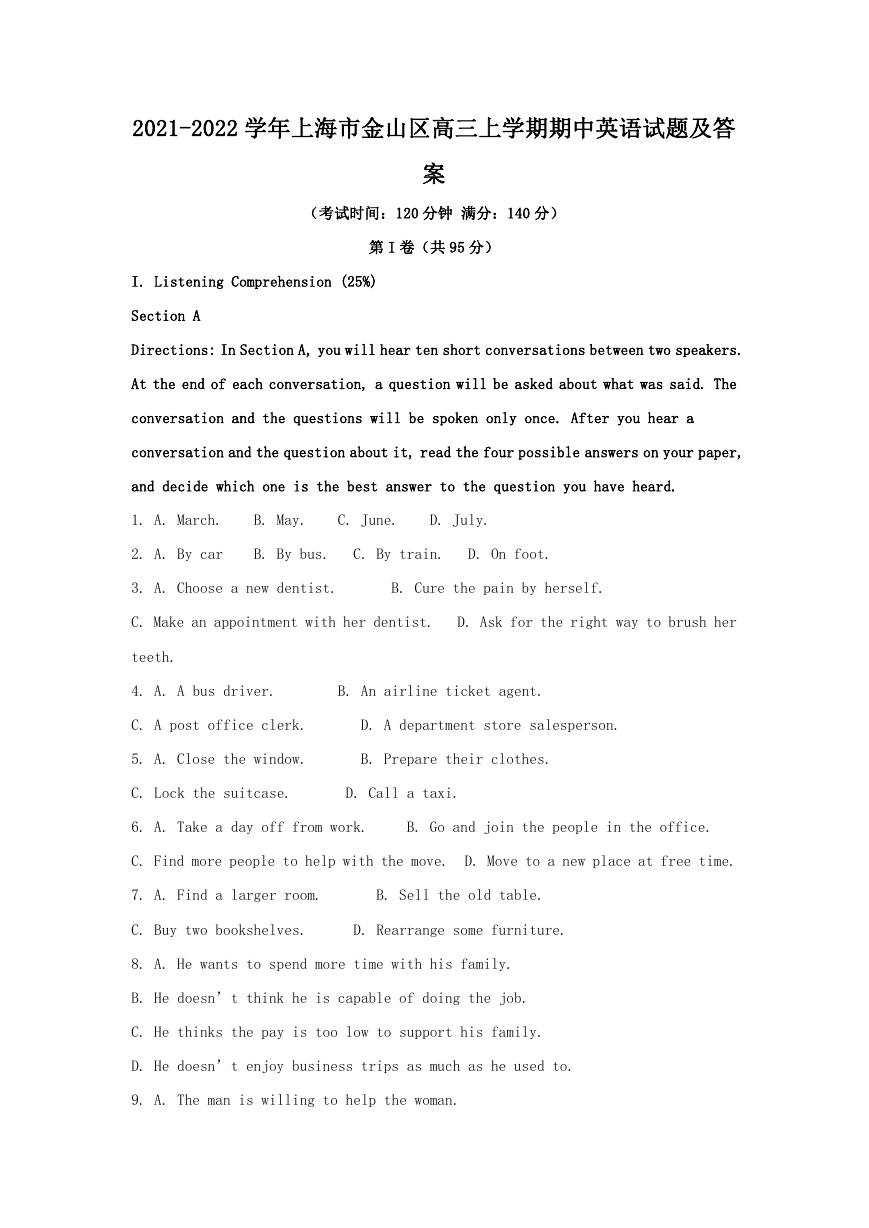
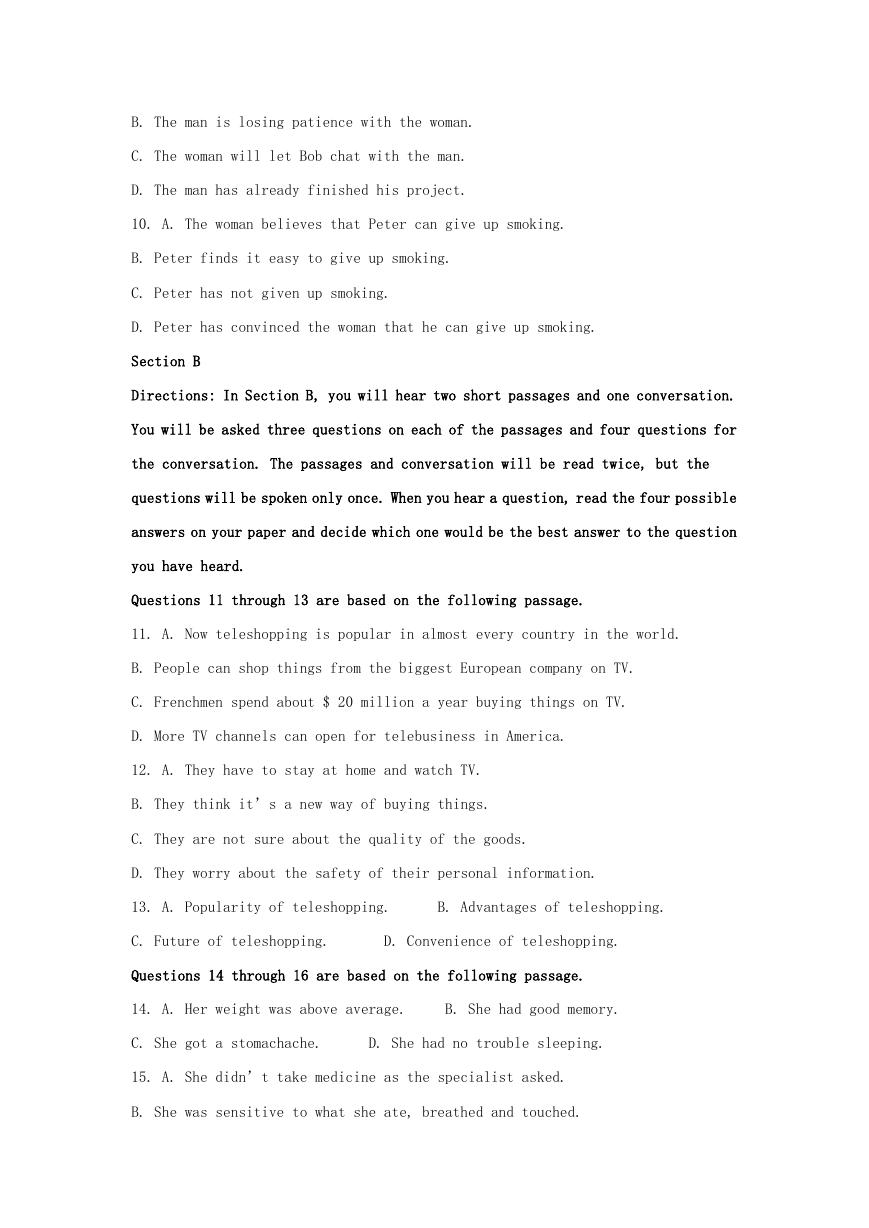

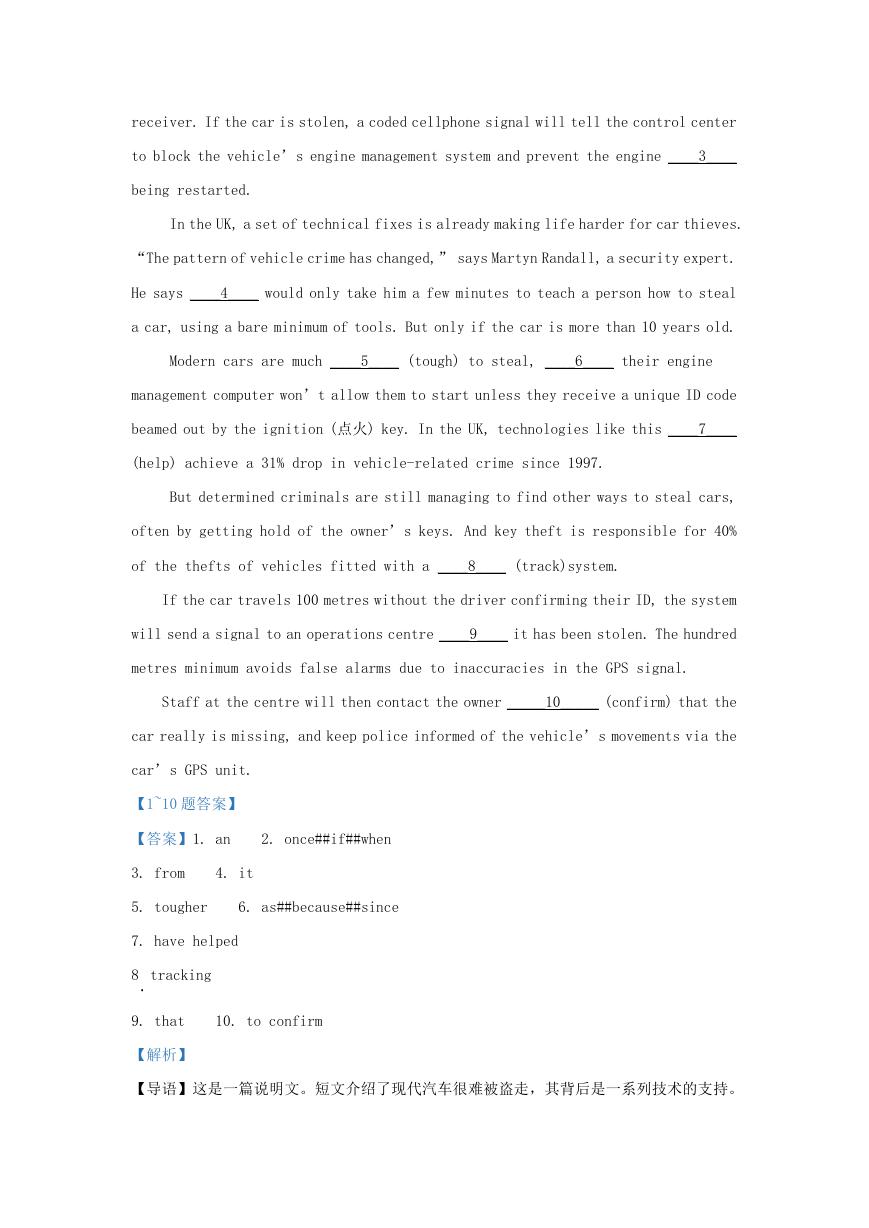

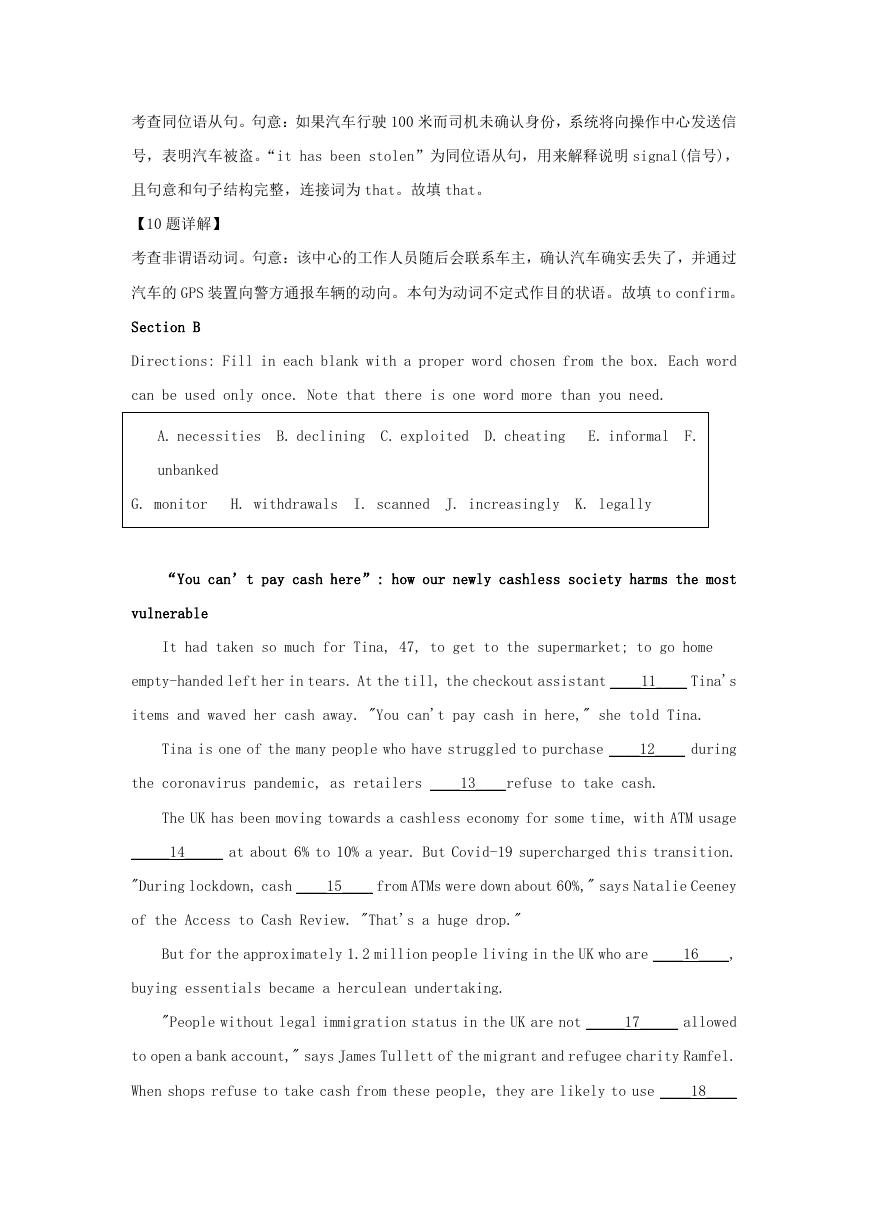

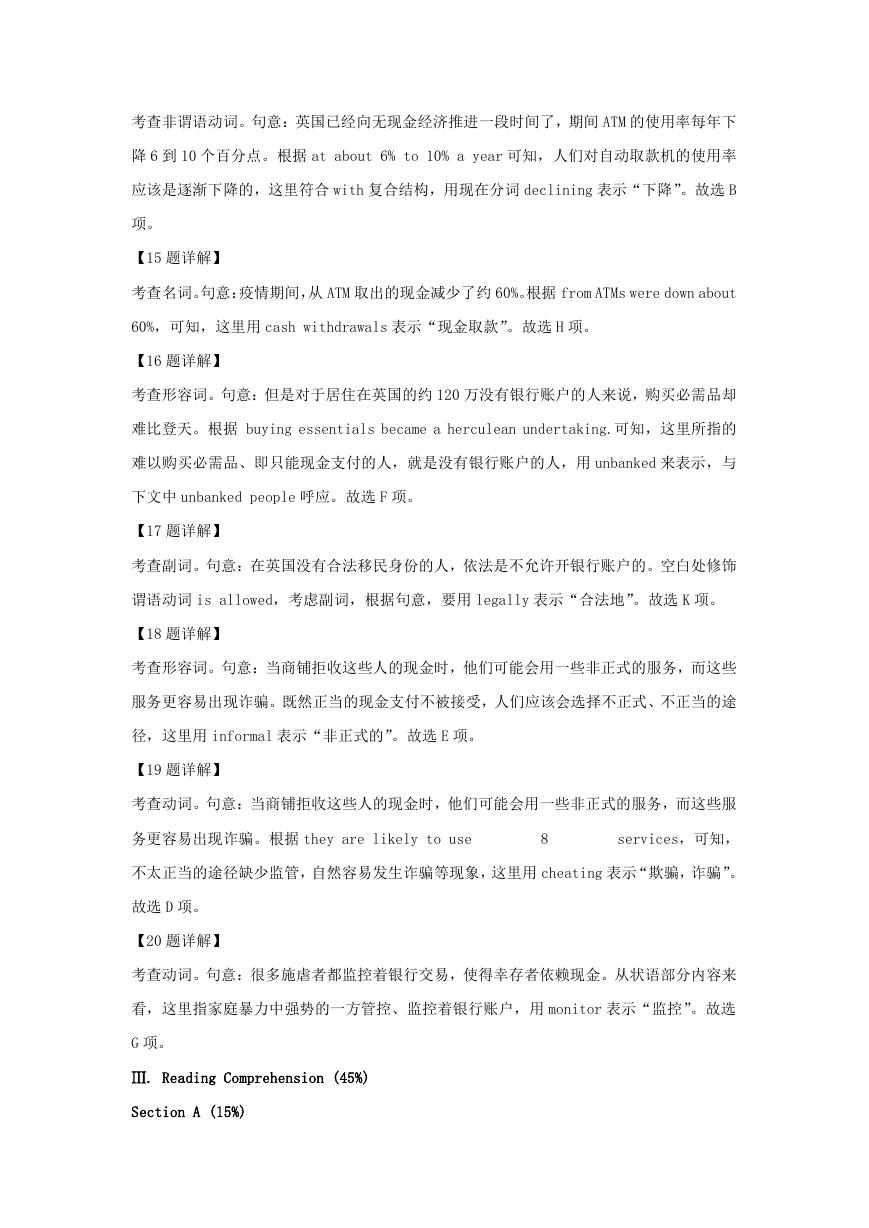








 2023年江西萍乡中考道德与法治真题及答案.doc
2023年江西萍乡中考道德与法治真题及答案.doc 2012年重庆南川中考生物真题及答案.doc
2012年重庆南川中考生物真题及答案.doc 2013年江西师范大学地理学综合及文艺理论基础考研真题.doc
2013年江西师范大学地理学综合及文艺理论基础考研真题.doc 2020年四川甘孜小升初语文真题及答案I卷.doc
2020年四川甘孜小升初语文真题及答案I卷.doc 2020年注册岩土工程师专业基础考试真题及答案.doc
2020年注册岩土工程师专业基础考试真题及答案.doc 2023-2024学年福建省厦门市九年级上学期数学月考试题及答案.doc
2023-2024学年福建省厦门市九年级上学期数学月考试题及答案.doc 2021-2022学年辽宁省沈阳市大东区九年级上学期语文期末试题及答案.doc
2021-2022学年辽宁省沈阳市大东区九年级上学期语文期末试题及答案.doc 2022-2023学年北京东城区初三第一学期物理期末试卷及答案.doc
2022-2023学年北京东城区初三第一学期物理期末试卷及答案.doc 2018上半年江西教师资格初中地理学科知识与教学能力真题及答案.doc
2018上半年江西教师资格初中地理学科知识与教学能力真题及答案.doc 2012年河北国家公务员申论考试真题及答案-省级.doc
2012年河北国家公务员申论考试真题及答案-省级.doc 2020-2021学年江苏省扬州市江都区邵樊片九年级上学期数学第一次质量检测试题及答案.doc
2020-2021学年江苏省扬州市江都区邵樊片九年级上学期数学第一次质量检测试题及答案.doc 2022下半年黑龙江教师资格证中学综合素质真题及答案.doc
2022下半年黑龙江教师资格证中学综合素质真题及答案.doc